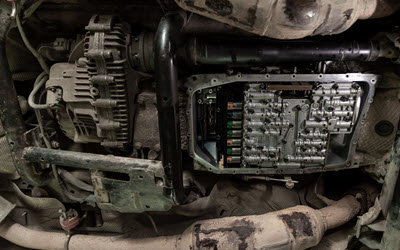A vital part of the Porsche that suffers breakdown is the transmission valve body. A transmission valve body is a component that functions as the control center for automatic transmission processes alongside other components in your car. It operates on a liquid known as the hydraulic fluid.
The gears that your car switches into are determined by the valves that open when the hydraulic fluid passes through the valve body. The transmission valve body also receives commands from the sensors in your car to measure speed, engine load, and throttle.
By these functions, it is evident that when something goes wrong with the transmission valve body, it is a major fault that could affect the overall performance of your car, especially in mobility.
Signs of a Transmission Valve Body Failure
- Garage Shift: When your car does not respond quickly while you are trying to move it from its parked state to drive, to reverse, turn or drive out, the car is suffering a garage shift. This happens as a result of a transmission valve body failure in your Porsche. You should check the valve body, diagnose the fault, and attend to the issue swiftly so that it does not become worse. This is also known as a shifting delay.
- Check Engine Light: The check engine light in your Porsche is primarily designed to warn you of faults affecting the engine. Do not ignore the warning from this light. Call for a technician to inspect and properly diagnose an engine warning light.
- Hitting or Knocking Sounds: You may hear unusual noses when you drive, change gears, or accelerate. This could be a sign of a transmission valve body failure. These sounds are produced when broken down parts or valves that are not in their proper places hit against each other. This is why the sounds can be more easily noticed when the car is in motion.
- Sporadic Gear Shifts: When your car revs up very suddenly while trying to start the engine, change gears, or accelerate, and then it immediately slows down, it could be a sign of an error with the transmission valve body. This condition is also known as a shift flare.
Effects of Transmission Valve Body Failure
- Slow Response: A transmission valve body failure would cause your car to respond slowly to commands that you give it, especially from the steering wheel and gearbox. This is because a fault in the transmission valve body would specifically affect the motion results of the car. It is more dangerous because when the car finally responds, it may do so with a sudden jerking motion before it finally moves in the direction you have commanded.
- Inadvertent Acceleration or Deceleration: A failing transmission valve body could cause your car to accelerate or decelerate on its own, even while you do not give it such command. This can be very dangerous because it happens suddenly, catches you unaware, and is difficult to manage. This can put pedestrians in a crosswalk in front of you in danger, or you could hit the car in front of you.
- Gear Slips: A fault in the transmission valve body could cause the gear of your car to change before it should or adjust without request. This is often called a slipped gear. This is not safe for you and your car, so you should call the attention of a Porsche-certified technician to it immediately.
What to Do when Your Porsche Suffers a Transmission Valve Body Failure
An issue with the transmission valve body in  your Porsche can be very dangerous, and so, handling the issue should be both swift and secure. To achieve this, you must employ the services of a Porsche specialist or expert technician. Auto Assets is that expert with over 30 years of experience in servicing European brands, like your Porsche. We proudly serve our neighbors in areas like Columbus, Dublin, New Albany, Worthington, Powell, and OH. Reach out to us today to speak to one of our friendly staff members to set up a convenient appointment. We look forward to earning your future business for all your Porsche maintenance and service needs.
your Porsche can be very dangerous, and so, handling the issue should be both swift and secure. To achieve this, you must employ the services of a Porsche specialist or expert technician. Auto Assets is that expert with over 30 years of experience in servicing European brands, like your Porsche. We proudly serve our neighbors in areas like Columbus, Dublin, New Albany, Worthington, Powell, and OH. Reach out to us today to speak to one of our friendly staff members to set up a convenient appointment. We look forward to earning your future business for all your Porsche maintenance and service needs.
* Black Porsche 911 image credit goes to: photosvit.
 356 W Olentangy St, Powell, OH 43065, United States
356 W Olentangy St, Powell, OH 43065, United States 614-793-1050
614-793-1050 Weekdays 8am to 6pm, Saturday 9am to 4pm, Closed Sunday
Weekdays 8am to 6pm, Saturday 9am to 4pm, Closed Sunday 356 W Olentangy St, Powell, OH 43065
356 W Olentangy St, Powell, OH 43065





